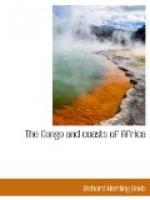That, in the early years, Leopold’s interest in the Congo was unselfish may or may not be granted, but, knowing him, as we now know him, as one of the shrewdest and, of speculators, the most unscrupulous, at the time of the Berlin Conference, his self-seeking may safely be accepted. Quietly, unostentatiously, he presented himself to its individual members as a candidate for the post of administrator of this new territory.
On the face of it he seemed an admirable choice. He was a sovereign of a kingdom too unimportant to be feared; of the newly created State he undoubtedly possessed an intimate knowledge. He promised to give to the Dutch, English, and Portuguese traders, already for many years established on the Congo, his heartiest aid, and, for those traders still to come, to maintain the “open door.” His professions of a desire to help the natives were profuse. He became the unanimous choice of the conference.
Later he announced to the Powers signing the act, that from Belgium he had received the right to assume the title of King of the Independent State of the Congo. The Powers recognized his new title.
The fact that Leopold, King of Belgium, was king also of the Etat Independant du Congo confused many into thinking that the Free State was a colony, or under the protection, of Belgium. As we have seen, it is not. A Belgian may serve in the army of the Free State, or in a civil capacity, as may a man of any nation, but, although with few exceptions only Belgians are employed in the Free State, and although to help the King in the Congo, the Belgian Government has loaned him great sums of money, politically and constitutionally the two governments are as independent of each other as France and Spain.
And so, in 1885, Leopold, by the grace of fourteen governments, was appointed their steward over a great estate in which each of the governments still holds an equal right; a trustee and keeper over twenty millions of “black brothers” whose “moral and material welfare” each government had promised to protect.
There is only one thing more remarkable than the fact that Leopold was able to turn this public market into a private park, and that is, that he has been permitted to do so. It is true he is a man of wonderful ability. For his own ends he is a magnificent organizer. But in the fourteen governments that created him there have been, and to-day there are, men, if less unscrupulous, of quite as great ability; statesmen, jealous and quick to guard the rights of the people they represent, people who since the twelfth century have been traders, who since 1808 have declared slavery abolished.
And yet, for twenty-five years these statesmen have watched Leopold disobey every provision in the act of the conference. Were they to visit the Congo, they could see for themselves the jungle creeping in and burying their trading posts, their great factories turned into barracks. They know that the blacks they mutually agreed to protect have been reduced to slavery worse than that they suffered from the Arabs, that hundreds of thousands of them have fled from the Congo, and that those that remain have been mutilated, maimed, or, what was more merciful, murdered. And yet the fourteen governments, including the United States, have done nothing.




